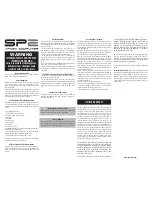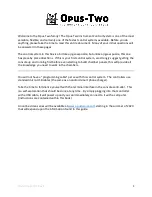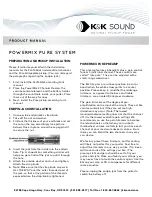
Digital clamp meter
ENGLISH
ENG
ENG
KPS SOLUCIONES EN ENERGÍA, S.L.
Parque Empresarial de Argame,
C/Picu Castiellu, Parcelas i-1 a i-3
E-33163 Argame, Morcí
n
Asturias, España, (Spain)
See the full
instruction manual:
Introduction
WARNING
Make sure to read and follow all safety procedures to avoid electric shock and/or injury.
The meter is a safe, reliable, yet small handled 3
3/4
digita digital clamp meter. Capable of
measuring AC current, AC/DC voltage, resistance, and continuity, it’s ideal for both home
users and professionals.
Safety Instructions
WARNING
The special attention should be paid whenusing the meter because the improper usage
may cause electric shock and damage the meter .The safety measures in common safety
regulations and operating instruction should be complied with when using. In order to
make fully use of its functions and ensure safe operations please comply with the usage
in this section carefully.
The meter is designed and manufactured according to safety requirements of EN 61010-
1:2010,EN 61010-2-032, EN 61010-2-033 on electronic measuring instrument and handheld
digital mul ti purposemeter. And conforms to UL STD.61010-1,61010-2-032,61010-2-033,
Certified to CSA STD.C22.2 NO.61010-1, 61010-2-032, 61010-2-033. The product meets
with the requirements of 600V CAT III and pollution degree 2.
All safety guidelines outlined should be followed otherwise the protection provided by the
instrument may be impaired.
Warning symbols in the manual alert users of potential dangerous situations.
Precautions are to prevent the user from damaging the instrument or the test object.
Precautions
To avoid possible electric shock, personal injury or damage to the meter, please observe
the following:
•
Before using the meter, check the meter for damage during transport.
• Check the test leads for damage to the insulation or wires before use.
• Ensure the meter works properly by testing a known voltage first. If not working properly,
have the meter serviced before using.
• Never exceed the protection limit values indicated in the specifications for each range of
measurement.
• Always use caution when making voltage measurements above 60V dc or 30V ac rms.
• Make sure to use the correct input jack, function and range when measuring.
• Do not place the meter in any environment with dust, explosive gas or vapor.
• Always keep fingers behind the probe barriers.
• Connect the common test lead first, then the hot lead. Disconnect in reverse order.
• Turn off power and discharge capacitors before measuring resistance, diodes or continuity.
• Failure to follow safety guidelines may prevent the meter ’s built in protection from working
properly.
• To avoid damage or incorrect readings, check for AC voltage present before making DC
voltage measurements.
• Do not use the meter with the battery cover not securely in place.
• When the “
”symbol appears, replace the batteries to avoid incorrect readings
•
Before opening the case, always disconnect test leads from all energized circuits.
• Only use the test leads provided with the meter. Replace only with similar leads with
matching specifications.
• Do not touch input jacks during measurement to avoid electric shock.
•
Before switching functions, remove test leads from an circuit.
General Maintenance
This section provides basic maintenance principles, including cleaning and battery
replacement. Do not attempt to do any repair or calibration to the meter unless you are
experienced maintenance personnel.
WARNING
Remove test leads from meter before opening the battery cover to avoid damage or injury.
Use a damp cloth and a small amount of detergent to clean the meter regularly. Do not use
abrasives or chemical solvents. Dirty or wet input jacks can affect readings.
To clean the input jacks:
• Turn off meter and remove test leads.
• Wipe any debris off input jacks.
• Use a cotton swab with a cleaner/lubricant (i.e. WD-40) to clean jacks.
• Use a new swab for each jack to prevent cross contamination.
Replacing the Batteries
WARNING
To avoid false reading that can lead to injury or damage to the meter, replace the battery
as soon as the low battery symbol “
“ appears.
Remove test leads and disconnect from all circuits before opening the battery cover.
To replace the batteries:
• Turn off the meter and remove test leads.
• Unscrew the battery cover.
• Replace the used batteries with the new ones. Be sure to observe polarity when replacing
batteries.
• Replace battery cover and tighten before use.
+
Replacing Test Leads
WARNING
Use meet EN 61010-031 standard, rated CAT III 600V or better test leads.
WARNING
When replacing test leads, only use similar leads or leads with same specs as those
provided. Lead specs: 600V, 10A.
Replace test leads if leads become damaged or worn.
Accesories
Summary instruction manual
1 piece
Test leads
1 pair
Type-K Thermocouple
1 piece
Case
1 piece
AAA batteries (1.5V)
3 pieces
ENGLISH
APAC:
MGL GLOBAL SOLUTIONS LTD
Flat 4-1, 4/F, No. 35, Section 3 Minquan
East Road. Taipei, Taiwan.
Tel: +886 2-2508-0877
EMEA:
MGL EUMAN S.L.
Parque Empresarial Argame, 33163
Morcín. Asturias, Spain.
Tel: +34 985-08-18-70
AMERICAS:
MGL AMERICA, LLC.
US East Coast:
2810 Coliseum Centre
Drive, Ste. 100. Charlotte, North Carolina,
28217 USA
Tel: +1 833 533-5899
US West Coast:
760 Challenger Street.
Brea, California 92821 USA
Tel: +1 310-728-6220
www.mgl-intl.com




















